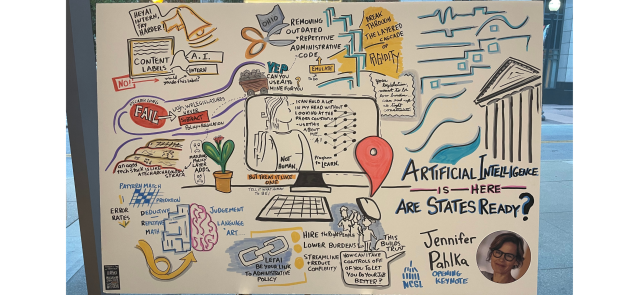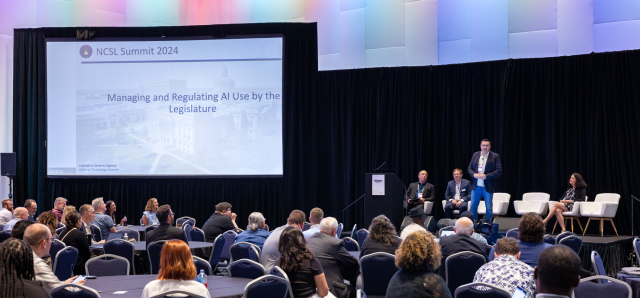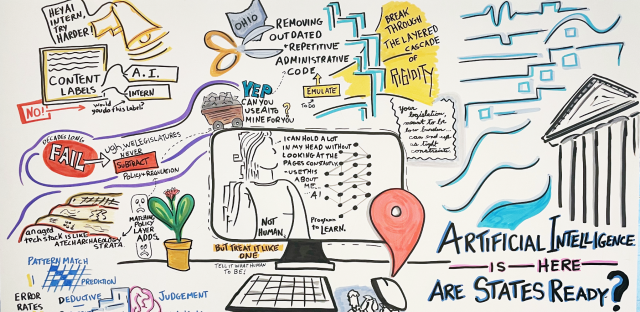Four years after the 2020 election spawned countless challenges, concerns and conspiracy theories — and on the brink of another presidential contest — how have election policies changed?
Dozens of lawmakers, election officials and staffers gathered to discuss that question and others during a five-plus-hour session Thursday, the day after the bulk of the annual National Conference of State Legislatures summit wrapped up.
Charles Stewart III, a political scientist at the Massachusetts Institute of Technology, explored how the COVID-19 pandemic affected policies before and after the 2020 election.
The early pandemic saw many state primaries being pushed back, coupled with a massive expansion in voting by mail.
“Not surprisingly … there were a lot of problems,” Stewart said, including rejected ballots and concerns with postal service and reporting delays.
Before the pandemic, the share of in-person voters gradually decreased from 89% in the late 1990s to 60% by 2018, Stewart said. But in 2020, for the first time in the nation’s history, less than half of all voters cast ballots at polling booths.
There was also a sharp partisan divide between those who voted by mail and those who voted on Election Day: More Democrats voted by mail, while more Republicans voted in person. Voting patterns returned to their previous trend in 2022, though mail voting was still higher than in the pre-pandemic period.
“Issues of auditing became front and center and are a secret, silent issue that’s going to continue into the present,” Stewart said, as did the issue of counting speed, or how fast unofficial results were reported on election night.
He said voters from the party in power in a state were historically more trusting than the party out of power. In 2020, however, Republicans everywhere were more distrustful of election results, particularly in battleground states and states with high mail voting. That pattern eased a bit in 2022, except in Arizona and Pennsylvania.
The biggest correlation? Stewart said people who felt their own polling place was run well were significantly more likely to trust the election results, both locally and nationally.
“There is one thing in control of election administrators: running a good election,” he said.
Several experts outlined their best strategies on how to run a good election — and how to reassure voters that elections are secure.
There are more than 10,000 election jurisdictions nationwide, each with different policies and procedures, according to Tammy Patrick, chief program officer for the National Association of Election Officials.
Just 8% of election offices serve 75% of the nation’s voters because many dense urban areas have only one jurisdiction.
Transparency is important, Patrick said, but a paradox exists because officials can’t reveal everything — such as security procedures — because it would open election systems to foreign threats.
In the run-up to the 2024 general election, Patrick expects foreign adversaries to attempt to undermine confidence in the election system.
Elected officials can build voter trust in the election process in three key ways, said Matt Germer, director of the governance program at the R Street Institute, a free-market think tank:
- Publicly affirm the security and integrity of American elections.
- Use transparency and public outreach to drive public confidence.
- Champion policy changes in the spirit of continuous improvement.
Officials shouldn’t intentionally raise the stakes during debates over election bills by implying elections wouldn’t be secure without reforms, Germer said.
Former Colorado Secretary of State Wayne Williams said the keys to establishing trust include publishing rules and guidelines in advance, using voter-verifiable paper ballots and sharing information as soon as possible.
The more delays there are during the reporting process, the more time there is for people to speculate and spread conspiracy theories. Williams encouraged officials to be as transparent and open as possible.
“The hardest thing to defend is, ‘They wouldn’t let me see,’” he said.
Officials should listen to and attempt to respond to every question, Williams said, adding that “not every question is an insurrection.”
“I may never persuade the hardcore zealots on either side,” he said, “but who I want to persuade is the people who hear them.”
Heather Balas, vice president of Election Reformers Network, said her organization has developed an online toolkit to help election officials communicate with the media and the public during elections that go into “overtime” — ones with narrow margins and hotly contested legal disputes.
Word choice can have a big impact, Germer said, such as the rhetorical difference between “purging” voter rolls versus “list maintenance.”
“The trust in a system is impacted by elites and the way they talk about it,” he said.
Brett Stover is a Statehouse reporter at State Affairs Pro Kansas/Hawver’s Capitol Report. Reach him at [email protected] or on X @BrettStoverKS.






